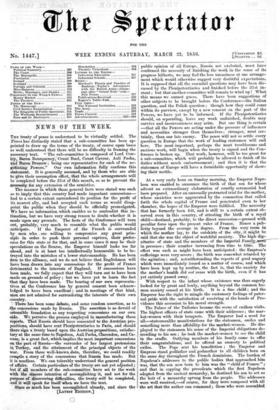NEWS OF THE WEEK.
THE treaty of peace is understood to be virtually settled. The
Times has distinctly stated that a sub-committee has been ap- pointed to draw up the terms of the treaty, of course upon bases so well understood that there will be no difficulty in framing the necessary text. " The sub-oommittee is composed of Lord Cow- ley, Baron Bourqueney; Count Bud, Count Cavour, Aali Pasha, and Baron Brunow ; being one representative for each of the ne- gotiating Powers." Our own information fully confirms this statement. It is generally assumed, and by those who are able gotiating Powers." Our own information fully confirms this statement. It is generally assumed, and by those who are able to give their assumption effect, that the whole arrangements will be completed before the 31st of this month, so as to prevent the necessity for any extension of the armistice. The manner in which these general facts were stated was such as to_ imply that -this country had made important concessions— had to a certain extent surrendered its position for the profit of its nearest ally, and had accepted such terms as would disap- pOint the public when they should be officially promulgated.
We have no information which enables us to contradict this in- timation, but we have very strong reason to doubt whether it is made upon any grounds. The facts of the Conference will turn out, probably, very much to resemble what the public would .anticipate. If the Emperor of the French is surrounded by men who are willing to compromise any great prin- ciple in order to push their personal caprices, their prefer- ence for this state or for that, and in some oases it may be their speculations on the Bourse, the Emperor himself looks too far ahead, and is at least too intellectually honourable to be be- trayed into the mistakes of a lower statesmanship. He has been Arm to the alliance, and we do not believe that Raglishmen will have been drawn into any concessions for the profit of France -detrimental to the interests of England. If concessions have been made, we fully expect that they will turn out to have been made on grounds of policy ; but we have yet to learn the fact that they have been made. The bearing of our own representa- tives at the Conference has by general consent been acknow- ledged to have been excellent ; and in meetings of that kind, Men are not admired for surrendering the interests of their own :country.
There has been some debate, and some random assertion, as to the concessions made by Russia. The assertion is as devoid of
ostensible foundation as any respecting concessions on our own side. We perceive the process employed in manufacturing these, reports. ThafEussia should have consented to the Austrian pro-_ positions, should have sent-Plenipotentiaries to Paris, and should there sign a treaty based upon the Austrian propositions, satisfac- tory at the same time to Napoleon, Aali Pasha, Clarendon, and Ca-, your, is a great fact, which implies the most important concessions on the part of Russia—the surrender of her largest pretensions in Turkey, and the attainment of the principal objects of the war. From these well-known data, therefore, we could readily compile a story of the concessions that Russia has made. But it is needless. 'We can tolerably understand the general position of affairs. Certain particulars of the treaty are not yet adjusted but if all members of the sub-committee have set to the work with the sincere intention of accomplishing it, and not for the purpose of discovering difficulties, the treaty will be completed, and it will speak for itself when we have the text.
Since so much has been accomplished already, and since the
public opinion of all Europe, ,Russia not excluded, must have confirmed the necessity of finishing the work in the sense of its progress hitherto, we may feel the less uneasiness at one arrange- ment which would otherwise suggest very doubtful expectations, It is supposed that all the essential questions may have been dis- cussed by the Plenipotentiaries and finished before the 31st in-; stunt ; but that another committee will remain to wind up ! What this means we cannot guess. There have been suggestions of other subjects to be brought before the Conference—the Italian question, and the Polish question ; though how they could come within its purview, except by a new consent on the part of the Powers, we have yet to be informed. If the Plenipotentiaries should, on separating, leave any work unfinished, doubts may survive and inconveniences may arise. But one thing is certain —that all the Powers are acting under the pressure of influences and necessities stronger than themselves ; stronger, mast 'cer- tainly, than our late enemy. The peace will not so settle every question in Europe that the work of leading statesmen ' will end here. The most important, perhaps the most troublesome and anxious work, will begin when the treaty is signed and the Con- ference is broken up. That work, however, will be too great for a sub-committee, which will probably be allowed to finish off its duties without much embarrassment ; and then it is that the statesmen of Europe will have a formidable opportunity of show- ing their mettle.


























